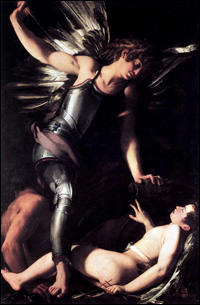
I long to talk with some old lover's ghost,
I cannot think that he, who then loved most,
Sunk so low as to love one which did scorn.
But since this god produced a destiny,
And that vice-nature, custom, lets it be,
I must love her that loves not me.
Sure, they which made him god, meant not so much,
Nor he in his young godhead practised it.
But when an even flame two hearts did touch,
His office was indulgently to fit
Actives to passives. Correspondency
Only his subject was ; it cannot be
Love, till I love her, who loves me.
But every modern god will now extend
His vast prerogative as far as Jove.
To rage, to lust, to write to, to commend,
All is the purlieu of the god of love.
O ! were we waken'd by this tyranny
To ungod this child again, it could not be
I should love her, who loves not me.
Rebel and atheist too, why murmur I,
As though I felt the worst that love could do?
Love might make me leave loving, or might try
A deeper plague, to make her love me too ;
Which, since she loves before, I'm loth to see.
Falsehood is worse than hate ; and that must be,
If she whom I love, should love me.
In this poem the speaker presents the argument that true love does not exist unless both members of the relationship love each other equally. The speaker wishes that he could return to a time before the god of love was born so that he would not be forced to love a woman that does not love him back. In line two the speaker describes the god of love, or Eros, as a capricious tyrant who plays with the feelings of others without considering them. Donne reveals the importance of this argument or idea through the repetition of similar lines at the end of each stanza: ‘Love, till I love her, who loves me’. Even if these lines are not symmetric and could not be considered as a refrain, they bring the idea of the subject of the poem back at each stanza. In this poem Donne uses a meter to underline the importance of the stanzas in each poem.
http://www.oppapers.com/essays/Loves-Deity/101206
http://www.highbeam.com/doc/1P1-28046852.html
http://www.highbeam.com/doc/1G1-72276311.html
http://www.nytimes.com/2007/05/13/books/review/Mallon-t.html?pagewanted=1&_r=1